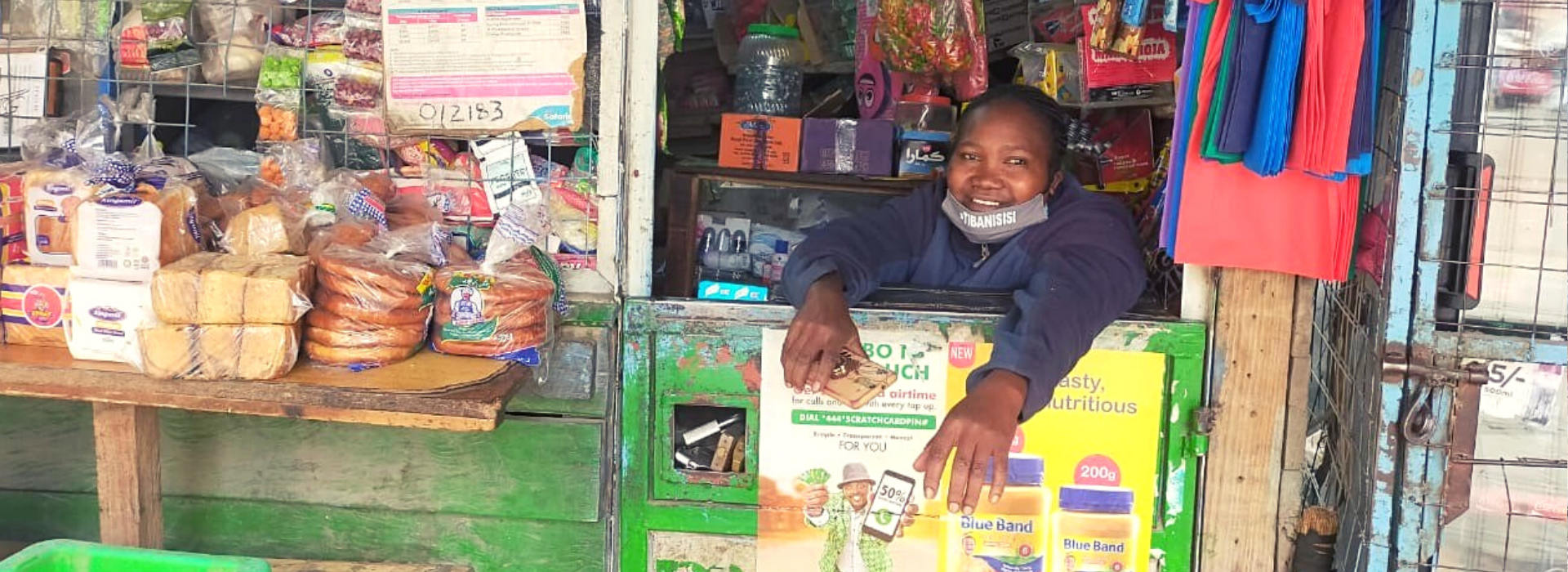
What’s in stock for micro merchants? The working capital they need to grow
December 10, 2020 | By Maggie SiegerStella Kagwiria opened her small shop in Kenya 20 years ago, hoping it would provide stability for herself and a foundation for her children’s futures. Profits would help her build a house so she could be a homeowner rather than a renter, and ensure her children would receive a solid education. But Kagwiria, who lives on the outskirts of Nairobi, was limited to buying stock with the cash she had on hand, frequently resulting in bare shelves and reducing her capacity to earn income.
Kagwiria is one of hundreds of millions of micro merchants across the world who are seriously disadvantaged by the cash nature of their businesses. Every day, they can sell only what they can afford to buy, limiting revenue and growth. There’s no way to get ahead and build savings, much less wealth.
A cash-only world also excludes Kagwiria from all the benefits of the modern economy. If she could open a line of credit, for example, she could buy all the stock she could sell, grow her earnings and inject more money into her local economy. Without a verifiable sales history and other data necessary for banks and lenders to assess her creditworthiness, Kagwiria is stuck.
The cash economy also hinders suppliers’ local sales reps, as they have to limit what they can sell to Kagwiria, creating an impoverishing loop. The suppliers lose out, too, and not just because they can’t move product. A cash trail is neither reliable nor stable, limiting ability to project future needs or sales.
This problem isn’t unique to Kenya. Every year, $19.8 trillion in payments are made and accepted by micro, small and medium retailers in developing markets globally. More than 70% of those are made in cash or checks. The International Finance Corporation estimates 60% of small businesses in developing markets are either unserved or underserved when it comes to financial services, and woman-owned businesses are even worse off.
Digital solutions that harness the collective power of entrepreneurs, their suppliers and financial institutions can help. That’s the mission of the Mastercard Track Micro Credit Program, an inclusive credit ecosystem that connects small retailers and micro businesses and fast-moving consumer goods companies (FMCGs) – companies that sell everyday items such as soap and packaged foods – to banks and enables access to short-term credit utilizing sales data. It works by giving small stores digital credit accounts so they can purchase products from key suppliers.
The local name for the Kenya pilot, of which Kagwiria is part, is called Jaza Duka, Swahili for “fill up your store,” and it launched in 2018 with Unilever and KCB Bank Ltd. It includes reports and reconciliation tools for FMCG companies and distributors, as well as a financial and credit management training program to enhance merchants’ education through the Mastercard Center for Inclusive Growth. In two years, 20,000 merchants in Kenya have signed up.
The program has led to an overall 20% increase in sales orders to suppliers and helped quantify the economic impact of these small merchants. The strongest buy-in has been from young woman owners, a bonus since a World Bank report found that women are less likely to have bank accounts than men.
“By bringing a combination of technology and know-how to micro-retailers like Stella, we are helping put them on the path towards financial inclusion and empowering them to build a better future for themselves and their families,” says Karolina Szudrzynska, a director of business development for Enterprise Partnerships.
As the pandemic continues to upend commerce, Jaza Duka is proving the benefits of financial inclusion and digitization. For stores that are onboarded onto the platform and can show a reliable track record of working with credit, Jaza Duka has now introduced a COVID-19-specific relief package that includes direct financial support, critical health and safety tips, and free health products. Certain entrepreneurs will be able to apply for no-interest loans from other funders and take advantage of a free health insurance program through the end of the year.
More than 12,500 Jaza Duka merchants are receiving tailored financial training on navigating the pandemic and preparing for recovery.
"Jaza Duka has transformed the lives and businesses of thousands of micro-merchants in Kenya over the last two years," says Natasha Jamal, the Middle East/Africa regional director at the Center. "With access to much-needed credit along with a holistic COVID relief package that includes financial and non-financial assistance, merchants can start to rebuild and position themselves for a more resilient future.”
Applying lessons learned during the Kenya pilot, the Nairobi-based Mastercard Lab for Financial Inclusion has laid the foundation for a new technology platform for Track Micro Credit that is being scaled to other developing markets around the world, with the ability and capacity to support multiple banks and multiple suppliers.
“This is a holistic solution delivering meaningful intelligence to banks so they are able to extend credit to merchants who need it the most and drive digital transactions in communities traditionally outside the formal financial system,” says Jay Singer, the senior vice president leading the program. “It increases opportunities for merchants to grow and better meet the needs of their customers.”
Jaza Duka certainly changed her business and her life, Kagwiria says. As the sole provider for her family, she often struggled to pay rent on her shop and the rent and utilities for the home she shares with her husband and three children, a 17-year-old son and two 10-year-old daughters.
“Jaza Duka helped my business and income improve,” she says. By relieving the family’s financial strain, Kagwiria now can save for the new house and reliably pay rent – and her children’s school fees.